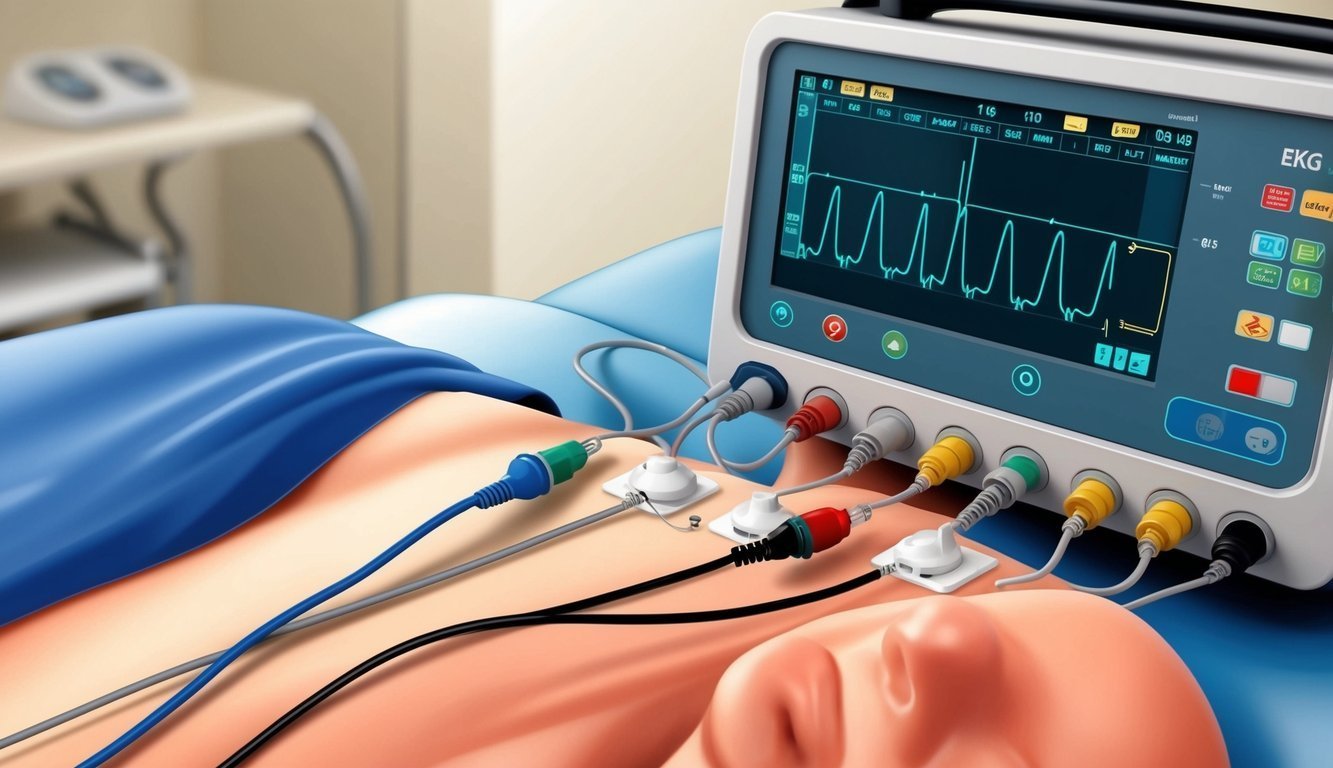If you’re considering a career in healthcare, becoming an EKG technician could be a rewarding path for you. EKG technicians play a crucial role in diagnosing heart conditions by measuring the heart’s electrical activity, making them vital members of the healthcare team. Understanding your role and opportunities can provide clarity on how to navigate this career successfully.
To excel as an EKG technician, you’ll need to complete specific training and obtain relevant certifications.
This position not only offers a chance to work in a dynamic environment but also provides opportunities for advancement in the healthcare field.
Many training programs focus on combining classroom learning with hands-on experience, ensuring you are well-prepared for the demands of the job.
If you’re eager to explore the qualifications, certifications, and job responsibilities in detail, you can find valuable insights on how to get started in this field.
For further information on the educational path and requirements, visit Nurse.org.
Becoming an EKG technician could be the next step in fulfilling your passion for patient care and making a difference in someone’s life.
Becoming an EKG Technician
To pursue a career as an EKG Technician, you need a solid foundation in education, certification, and understanding of EKG equipment.
These areas are essential for ensuring both competence and professionalism in the field.
Educational Requirements
A high school diploma or GED is the minimum educational requirement to become an EKG Technician.
In school, focus on courses such as anatomy, physiology, and math, which lay the groundwork for understanding EKG procedures.
Once you have your diploma, enrolling in an EKG technician program is the next step.
These programs typically last from ten weeks to four months and can be found at community colleges, vocational schools, and online platforms.
Higher education, such as an associate or bachelor’s degree in cardiovascular technology, can enhance your career opportunities and salary potential.
Programs often include both classroom learning and hands-on training with EKG equipment.
Certification Process
Certification is crucial for confirming your skills as an EKG Technician.
The National Healthcareer Association (NHA) offers the Certified EKG Technician (CET) certification, which is highly recognized in the industry.
To obtain this certification, you must pass the CET exam.
Preparation is vital, so consider using a study guide specific to the exam topics.
Many programs also provide recertification options that may require continuing education to maintain your credentials.
Once certified, you’ll find that many employers prefer or require certification for hiring.
This credential can significantly enhance your job prospects and credibility in the healthcare field.
Understanding EKG Equipment
Familiarity with EKG equipment is fundamental for your success.
An EKG machine records the electrical activity of the heart, producing an electrocardiogram (ECG).
You must learn to operate the machine effectively, ensuring correct placement of electrodes and understanding lead placement.
Additionally, you’ll need to be knowledgeable about interpreting EKG results, recognizing normal and abnormal rhythms.
Training programs typically include hands-on experience with EKG machines, helping you become proficient before entering the workforce.
Staying updated on technological advances in EKG equipment is vital.
Continuous learning and training can provide you with a competitive edge in the evolving healthcare landscape.
Roles and Responsibilities

As an EKG technician, your roles and responsibilities revolve around patient care and the execution of diagnostic tests.
These tasks require not only technical skills but also strong communication and attention to detail to ensure accurate results and effective patient interactions.
Patient Care and Interaction
In your role, patient care is paramount.
You explain procedures to patients clearly and ensure they feel comfortable during tests.
Effective communication helps to alleviate anxiety and build trust.
Attention to detail is critical.
You must accurately gather patient information and monitor any vital signs throughout the procedure.
Utilizing appropriate medical terminology enhances the professional interaction.
Additionally, your duties include monitoring patient responses during tests such as stress testing or Holter monitoring.
This job aspect ensures that you identify any abnormalities promptly, which is vital for patient safety.
Conducting Diagnostic Tests
Conducting diagnostic tests involves performing electrocardiograms (EKGs) that record the heart’s electrical activity.
You follow established EKG procedures meticulously to ensure reliability.
Understanding anatomy helps in placing electrodes correctly and interpreting the results accurately.
You will often need to collaborate with physicians to discuss findings and contribute to diagnosis.
In some cases, you may assist with cardiac monitoring, preparing patients for longer-term evaluations or outpatient testing.
Knowledge of diagnostic tests, including stress tests and Holter monitoring, enhances your role in monitoring heart health effectively.
Employment and Work Environment
As an EKG technician, you will find various career opportunities and diverse work settings that shape your daily responsibilities and professional growth.
Understanding where you may work and the job outlook can help you make informed decisions about your career path.
Career Opportunities and Projections
The demand for EKG technicians is strong, with job opportunities expected to grow in the coming years.
According to the Bureau of Labor Statistics, employment for cardiovascular technologists, including EKG technicians, is projected to increase by 7% from 2021 to 2031.
This growth is driven by an aging population and the rising prevalence of cardiovascular diseases.
Key employers include:
- Hospitals
- Physician offices
- Ambulatory care centers
- Outpatient care centers
These settings offer varied roles, sometimes overlapping with positions such as patient care technicians and phlebotomy technicians.
Work Settings
As an EKG technician, you have the opportunity to work in various environments.
The most common settings include:
| Setting Type | Description |
|---|---|
| Hospitals | Provide a fast-paced environment with advanced technology. |
| Physician Offices | More personalized patient care, often with a focus on preventive measures. |
| Outpatient Care Centers | Deal with scheduled appointments, allowing for a more predictable work environment. |
| Long-term Care Facilities | Focus on ongoing patient management and monitoring. |
In each of these settings, you collaborate with healthcare professionals, including cardiologists and nurses, to deliver critical patient care.
Your role is essential in contributing to accurate diagnoses and treatment plans.
Both the work settings and job projections indicate a robust future for EKG technicians in the healthcare industry.
Advancement and Continuing Education

Advancement in your career as an EKG technician often hinges on pursuing further education and specialized certifications.
Engaging in these opportunities not only enhances your skills but also opens doors to new career paths and increased earning potential.
Advanced Certifications and Specializations
Obtaining advanced certifications can significantly bolster your qualifications.
Pursuing certifications in areas like electrophysiology or advanced EKG techniques demonstrates your commitment to the field and may lead to opportunities in specialized cardiac health roles.
Examples of recognized certifications include:
| Certification | Focus Area |
|---|---|
| Holter Monitor Technician | Monitoring heart rhythms |
| Certified EKG Technician (CET) | General EKG competency |
| Advanced Cardiac Life Support | Emergency response techniques |
Maintaining these credentials requires ongoing continuing education and periodic recertification, ensuring that you stay updated with advancements in medical knowledge, anatomy, and physiology relevant to cardiology.
Higher Education and Career Growth
Consider pursuing higher education to enhance your career prospects.
Degrees such as an associate or bachelor’s degree in cardiovascular technology can provide a strong foundation for advanced roles.
This educational background prepares you for responsibilities involving advanced medical knowledge, such as interpreting complex cardiac data and managing patient care.
Higher education can also lead to administrative or teaching positions within the field.
Such roles typically offer improved job security and higher salaries.
Additional study can expand your understanding of cardiac health and further engage you in the latest technological advancements and methodologies, thereby enriching your professional experience.
Engaging in both advanced certifications and higher education forms a comprehensive strategy for career advancement in the EKG technician field.
Professional Insights
In the field of EKG technology, understanding salary expectations and the essential skills required can greatly influence your career progression.
This section highlights key information that can help you navigate your professional journey in this vital healthcare role.
Salary Expectations
As an EKG technician, your earning potential varies based on factors such as experience, location, and certification.
According to Salary.com, the average annual salary for EKG technicians in the United States is approximately $43,200.
Here’s a breakdown of salary ranges:
| Experience Level | Salary Range |
|---|---|
| Entry-Level | $33,839 – $38,500 |
| Mid-Level | $39,000 – $47,000 |
| Experienced | $48,000 – $56,191 |
Consider these factors impacting salary:
- Location: Urban centers may offer higher salaries.
- Certification: Holding additional certifications can increase your worth.
- Education: Those with an associate or bachelor’s degree often command better pay.
For more information on trends, you can refer to the Bureau of Labor Statistics.
Skills and Traits for Success
To excel as an EKG technician, you need several skills and traits.
- Attention to Detail: You must capture and interpret electrocardiography data accurately. This is crucial in diagnosing heart disease.
- Communication Skills: Clear communication with patients and healthcare professionals ensures effective patient care and understanding of procedures.
- Clinical Knowledge: Understanding cardiac health and the implications of various EKG readings enhances your evaluation skills.
- On-the-Job Training: Practical experience is invaluable. Engaging in training sessions can sharpen your technical abilities.
Cultivating these competencies will help you succeed.
Continuous learning in cardiology and electrocardiography keeps your skills current and relevant.

